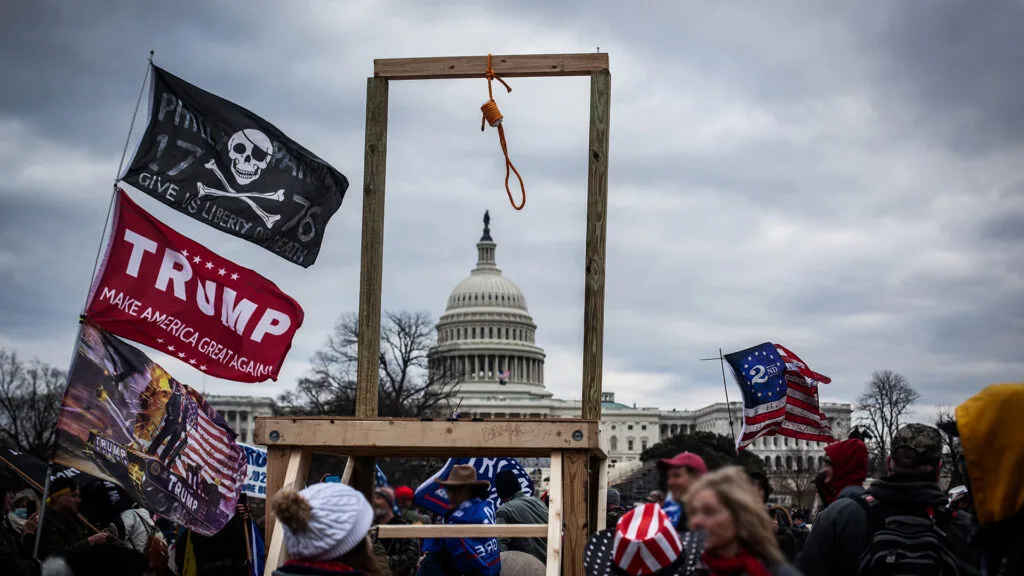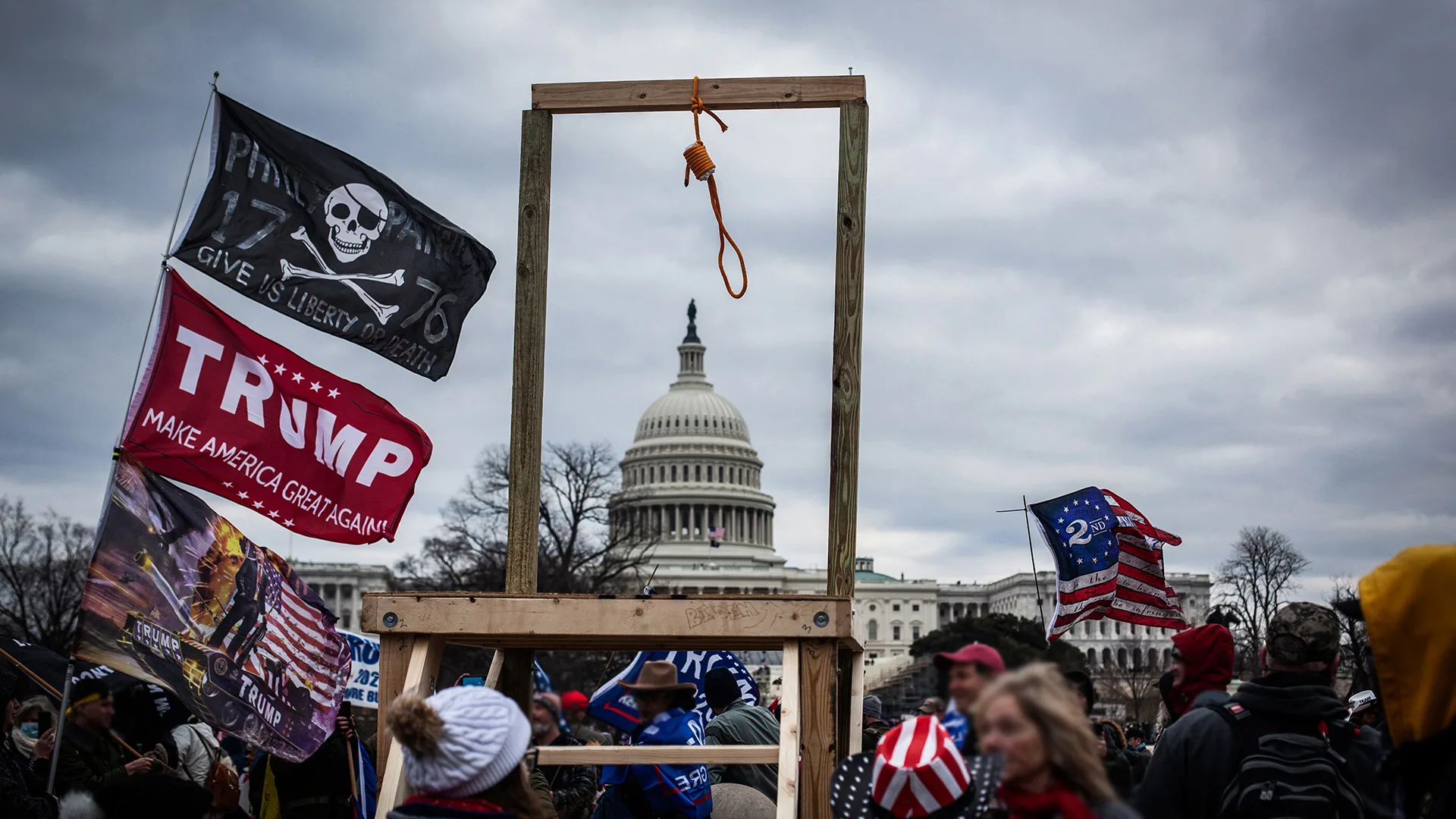‘Enabling It to Happen Again’: How Charlottesville Led to the Capitol Attack
January 26, 2021
Share
When rioters breached the U.S. Capitol on Jan. 6 in an attempt to prevent Congress from certifying Joe Biden’s presidential victory, they carried Confederate flags through the building; chanted, “Hang Mike Pence”; and erected a noose outside.
As the insurrection unfolded, President Donald Trump, who had told a crowd earlier in the day to “fight like hell” after weeks of undermining the election, tweeted criticism of his vice president for planning to certify the election results. Several hours after the rioters breached the Capitol, when Trump issued a video telling them to go home, he added, “We love you. You’re very special.”
As the new FRONTLINE documentary Trump’s American Carnage reports, it was a scene foreshadowed by the deadly 2017 Unite the Right rally in Charlottesville, Virginia — and by President Trump’s response to that moment.
“This is probably the first time where the country realizes, ‘This is gonna get bad,’” Yamiche Alcindor, a PBS NewsHour White House correspondent, says of Charlottesville in the documentary.
From filmmaker Michael Kirk and his team, Trump’s American Carnage traces the former president’s incitement of division, racism and ultimately insurrection throughout his term, drawing a line from the earlier rally to January’s fatal riot.
As the above excerpt explores, white supremacists and far-right extremists convened in Charlottesville from across the country in August 2017 to protest the removal of a Confederate statue, “many of them marching in Trump’s name,” author Joshua Green says in the documentary. The crowds chanted “Jews will not replace us” and “white lives matter.”
According to conservative commentator Charlie Sykes, “those folks were being brought back into the political mainstream by Donald Trump, and Charlottesville was the moment.”
During the rally, 32-year-old Heather Heyer was killed by a neo-Nazi who rammed his car into a crowd of anti-racist protesters. “This was an incident that was clearly the tale of these far-right, white-supremacist powers emboldened and out of control,” journalist Wesley Lowery tells FRONTLINE.
In grim detail, the documentary recounts what happened in the aftermath of the violence: In spoken remarks, Trump called the day “horrible” but initially declined to unequivocally condemn white supremacy. Instead, in an angry back-and-forth with members of the press, he said both sides present at the rally shared blame and had “very fine people” among their ranks.
A number of senior Republicans publicly rebuked Trump for his response to Charlottesville. Mike Pence was not among them. Although the vice president condemned white supremacists, Pence defended his boss, saying, “Many in the media spent an awful lot of time focusing on what the president said and criticisms of what the president said instead of criticizing those who brought the hatred and violence to the streets of Charlottesville, Virginia.”
“[Pence] certainly was appalled at the events in Charlottesville,” Olivia Troye, a former Pence aide, tells FRONTLINE in the excerpt. “I have heard him say that, behind closed doors. The problem is, this is a White House where, if he said that, it would be in direct contradiction to sort of the side-stepping that the president was doing. … by doing that, when you’re Mike Pence, you’re enabling it to happen again.”
Former Republican senator Bob Corker (R-TN) says Trump’s rhetoric around Charlottesville revealed the president’s stance on white supremacists and far-right extremists: The president “did not want to discourage this type of activity; as a matter of fact, wanted to encourage it,” Corker says. “And as we’ve seen over the course of his four years of service, the strength among those organizations, their place and what is happening around the country, has continued to increase.” (Several hardcore nativists and white supremacists who participated in the Charlottesville rally were also identified at the Capitol riot.)
“You have a president of the United States who is willing to give tacit approval to some of the darkest elements of American politics,” Charlie Sykes says about Charlottesville. “And even when it goes wrong, even when it turns ugly, he’s unwilling to denounce it. Because these were allies that were useful, and you didn’t want to alienate them.”
As Trump’s American Carnage goes on to recount, top Republicans ultimately stood by the president after Charlottesville. By Jan. 6, 2021, Trump’s ire — and that of protesters who believed they were acting on Trump’s behalf — would be directed at Pence himself.
For the full story, watch Trump’s American Carnage. The documentary premieres Tuesday, Jan. 26 at 10/9c on PBS stations (check local listings). It will also be available to stream in FRONTLINE’s online collection of documentaries, on YouTube and in the PBS Video App.

Related Documentaries
Latest Documentaries
Related Stories
Related Stories
Explore
Policies
Teacher Center
Funding for FRONTLINE is provided through the support of PBS viewers and by the Corporation for Public Broadcasting, with major support from Ford Foundation. Additional funding is provided the Abrams Foundation, Park Foundation, John D. and Catherine T. MacArthur Foundation, Heising-Simons Foundation, and the FRONTLINE Trust, with major support from Jon and Jo Ann Hagler on behalf of the Jon L. Hagler Foundation, and additional support from Koo and Patricia Yuen. FRONTLINE is a registered trademark of WGBH Educational Foundation. Web Site Copyright ©1995-2025 WGBH Educational Foundation. PBS is a 501(c)(3) not-for-profit organization.





















